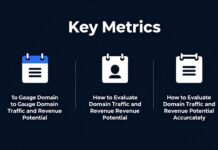Are you ready to win big at domain auctions? If you’ve ever wondered how some savvy investors snag premium domain names while others end up with mediocre ones, you’re in the right place! In this article, we’ll uncover strategies for success that can elevate your game and help you secure that dream domain you’ve been eyeing. With the right approach, domain investment can be highly lucrative, allowing you to unlock hidden potential in the digital marketplace. But how do you navigate the often chaotic world of domain auctions without getting lost in the hype?
Domain auctions are not just a gamble; they require a blend of strategy, research, and a dash of intuition. Many bidders jump in without a clear plan, leading to costly mistakes. In contrast, those who take the time to understand the domain auction process can position themselves for incredible wins. So, what are the key tactics that can set you apart? From mastering the art of bidding to identifying undervalued domains, we’ll explore the essential tips and tricks that can make all the difference. Are you curious about how to assess a domain’s value or how to avoid common pitfalls? Stick around, because this guide is packed with insights that could transform your approach to buying and selling domains.
By the end of this article, you’ll be equipped with the knowledge and confidence needed to take advantage of the exciting opportunities that lie at domain auctions. Get ready to dive deep into the world of domain name investing and emerge victorious!
Proven Strategies to Snag Premium Domains: Insider Tips for Successful Bidding
Finding premium domain names can be a tricky game, especially when you’re trying to get your hands on one at an auction. There are many factors that come into play, and if you don’t have a plan, you might end up spending way more than you need to. Here’s some insider tips and proven strategies that can help you snag those coveted domain names and win big at domain auctions.
Understanding Domain Auctions and Their Importance
Domain auctions are events where domain names are sold to the highest bidder. They can be held online or in-person, and they have become a popular way to buy and sell domains. Here’s why they are important:
- Access to Premium Domains: Auctions allow buyers access to names that are not available through traditional registration.
- Value Appreciation: Premium domains can appreciate significantly in value over time, making them a good investment.
- Brand Recognition: A memorable domain name can enhance your brand’s online presence.
Historically, domain auctions have evolved along with the internet, with platforms like GoDaddy, NameJet, and Sedo leading the charge. With millions of domain names registered, the competition can be fierce.
Research is Key
Before jumping into any auction, you need to do your homework. Researching the domain’s history and its potential can save you from making costly mistakes. Here are some things you should look into:
- Domain Age: Older domains can carry more authority.
- Previous Owners: Domains with a shady past can hurt your brand.
- Keyword Value: Domains with popular keywords can drive traffic.
You can use tools like WHOIS to check domain ownership history and tools like SEMrush to analyze keyword performance. Ignoring this step can lead to buying a domain that’s not worth your investment.
Set a Budget and Stick to It
One of the biggest mistakes people make at domain auctions is getting caught up in bidding wars. Set a budget before the auction starts and stick to it. Here’s a simple breakdown on how to create a bidding strategy:
- Determine Your Maximum Bid: Know the highest amount you’re willing to pay.
- Consider Potential Resale Value: Think about what you could sell it for in the future.
- Account for Auction Fees: Don’t forget to include any fees associated with the auction.
Utilize Bidding Tools and Alerts
Many domain auction platforms offer tools that can help you manage your bidding more effectively. Here’s a list of useful tools:
- Proxy Bidding: This allows you to set a max bid, and the system will automatically bid for you.
- Bid Alerts: Get notified when a domain you’re interested in is up for auction.
- Watchlists: Keep track of domains you want to monitor.
Using these tools can take some of the pressure off and help you make smarter decisions.
Networking and Community Engagement
Getting involved in the domain investing community can provide insights that you might not find elsewhere. Participate in forums, attend webinars, and join online groups. This can lead to valuable connections and insider knowledge about upcoming auctions.
- Forums: Sites like NamePros host discussions on recent trends and bidding strategies.
- Webinars: Many domain experts share their experiences and strategies in free online sessions.
- Social Media: Follow domain influencers on platforms like Twitter or LinkedIn.
Analyze Past Auction Results
Looking at past auction results can be beneficial in determining what similar domains have sold for. This can set realistic expectations for your bids. Here’s how to analyze past results:
- Look for Trends: Are certain types of domains consistently fetching high bids?
- Check Domain Extensions: .com domains usually sell for more than others.
- Identify Popular Keywords: This can help you know what to look for in future auctions.
Timing Your Bids
The timing of your bid can also play a crucial role in winning at auctions. Bidding too early can attract attention, while waiting until the last minute can be risky. Here are some strategies:
- Early Bidding: This can establish your interest but can also drive up the price.
- Last-Minute Bidding: Also known as sniping, this requires good timing and can catch other bidders off guard.
- Bid Increments: Understanding how much you can bid and when to increase your offer can keep you in the running.
If you follow these strategies and stay aware of the auction dynamics, your chances of winning premium domains will increase significantly. Remember that patience and research are your best friends in this game. So gear up, do your homework, and dive into the world of domain auctions with confidence!
The Ultimate Guide to Domain Auction Success: 7 Essential Tactics You Need to Know
Domain auctions have become a popular way for investors and entrepreneurs alike to acquire valuable online real estate. However, winning big at domain auctions isn’t just about luck; it’s about strategy and preparation. Follow this ultimate guide to domain auction success and learn seven essential tactics.
Understand the Domain Auction Landscape
Before diving into auctions, it’s crucial to grasp how they works. Domain auctions are platforms where sellers list their domain names for bidding. Buyers can bid on domains they find valuable or strategic for their business. The auction can be live or online, with bidding times ranging from hours to days.
Here are some popular domain auction platforms:
- GoDaddy Auctions
- Sedo
- Flippa
- NameJet
Each platform has its own rules and fees, so knowing that is important before you place a bid.
Research and Analyze Domains
One of the first steps to success is understanding what make a domain valuable. Factors such as length, keyword relevance, and brandability matters. Shorter domains generally tend to be more valuable, and keywords that align with popular industries can significantly increase a domain’s worth.
You should also look at:
- Search volume: Use tools like Google Keyword Planner to see how often keywords are searched.
- Previous sale prices: Websites like NameBio can provide historical sales data to know what similar domains sold for.
Set Your Budget Wisely
It’s easy to get carried away in the excitement of bidding. Set a clear budget before entering the auction. Consider these points:
- Factor in additional costs, like auction fees and possible renewal costs.
- Stick to your budget, even if you feel tempted to go higher.
Bidding wars can inflate prices quickly, and staying disciplined is crucial for long-term success.
Use Sniping Strategies
Sniping is when a bidder places a bid right at the end of an auction to secure the domain without giving others time to react. However, you have to be careful with this tactic as it requires precise timing. Here are some tips:
- Use automatic bidding tools if the platform allows.
- Keep an eye on the auction countdown clock and be ready!
This strategy can be risky; if you wait too long, you might miss out on the domain entirely.
Network with Other Bidders
Building relationships with other domain investors can be beneficial. You never know who might have insights or leads on valuable domains. Attend industry conferences, online webinars, or join forums related to domain investing. Networking can lead to partnerships, alliances, and even private sales that aren’t accessible to the general public.
Stay Informed About Market Trends
The domain market can change rapidly. Keeping track of trends helps you make informed decisions. For example, some industries might experience a surge in demand, making specific domains more valuable. Subscribe to industry newsletters, follow blogs, and engage in social media groups. Knowledge is power!
Analyze Your Competitors
Knowing who your competitors are can provide insights into their bidding strategies. Tools like Estibot allow you to estimate domain values, which can give you an edge in understanding how much others might be willing to bid.
Consider:
- What domains are they bidding on?
- What strategies are they using?
- What is their bidding behavior—aggressive or conservative?
By analyzing competitors, you can adjust your strategies to outmaneuver them.
Bid Responsively
Once you enter the auction, it’s important to adjust your strategy based on the bidding dynamics. Sometimes, you need to be flexible. If you see that many bidders are interested, you might want to reconsider your max bid.
Also, if the bidding is slow, it could indicate that the domain isn’t as valuable as you thought. Always keep an eye on the competition and be ready to pivot your approach.
When it comes to domain auctions, success requires a blend of research, strategy, and a bit of luck. By implementing these seven essential tactics—understanding the landscape, analyzing domains, budgeting, employing sniping strategies, networking, keeping up with trends, and responsive bidding—you can significantly increase your chances of winning big.
In the fast-paced world of domain auctions, staying informed and adaptable is key. With these strategies, you’re better equipped to navigate the competitive bidding environment and unlock the potential for substantial gains. Happy bidding!
How to Analyze Domain Value: Key Factors That Can Make or Break Your Auction Bid
In the ever-evolving world of domain auctions, understanding how to analyze domain value is crucial for anyone looking to win big. Whether you’re a seasoned investor or a newcomer just dipping your toes into the water, knowing what makes a domain valuable can make or break your auction bid. With the right strategies, you can unlock opportunities that lead to profitable outcomes. Here’s a deep dive into the key factors to consider when evaluating domain value and some winning strategies to apply at auctions.
Factors That Determine Domain Value
When considering a domain’s worth, several elements come into play. These can include:
Length of the Domain: Generally, shorter domains are more valuable. A two or three-word domain is often much easier to remember, making it more appealing to potential buyers.
Keyword Relevance: Domains that include popular keywords relevant to the industry can drive traffic and increase value. For instance, a domain like “BestCoffee.com” has higher visibility potential than “CoffeeShop1234.com.”
Brandability: A domain should be catchy and easy to spell. Unique names that are easy to brand often fetch higher prices.
Extension Type: The domain extension (TLD) matters. For example, .com domains typically hold more value than .net or .org because they are more recognized and trusted by users.
Market Trends: Sometimes, trends can significantly affect domain value. A domain related to a currently popular topic or technology might see a spike in its valuation.
Search Engine Optimization (SEO) Factors: Domains that have good SEO history can demand higher prices. If a domain has backlinks or previous traffic, it can be more desirable.
Legal Considerations: Be cautious of trademarks. If a domain name closely resembles a registered trademark, it could lead to legal complications, reducing its value.
Analyzing Auction Dynamics
Now that you know what affects domain value, it’s important to understand the dynamics of domain auctions. Auctions can be unpredictable, with bidding wars breaking out unexpectedly. Here’s how you can navigate them effectively:
Research is Key: Before placing a bid, do your homework. Look into similar domains and their sale prices. Websites like NameBio or GoDaddy Auctions can give you insights into past sales.
Set a Budget: Determine how much you are willing to spend before entering an auction. Stick to your budget strictly to avoid overspending in the heat of the moment.
Watch for Patterns: Observe how bidding trends develop. Some auctions may see rapid bidding at the start, while others might have a slow build-up. Understanding these patterns can provide valuable insights for your strategy.
Timing is Everything: Sometimes, waiting until the last few minutes to bid can save you money, especially if the auction is quiet. However, make sure to keep an eye on competitors who might be doing the same.
Engage with the Seller: If the auction platform allows, communicate with the seller to gauge their expectations. Knowing how much they want can help you strategize your bids.
Strategies for Winning Big
Winning at domain auctions isn’t just about placing high bids. Here are some strategies that could help you come out on top:
Use Proxy Bidding: Many auction platforms offer proxy bidding, where you set your maximum bid, and the system automatically bids for you up to that amount. This prevents you from getting caught up in bidding wars.
Join Auction Groups: Networking with other domain investors can provide insights and tips. Online forums and groups can be a treasure trove of information.
Diversify Interests: Don’t put all your eggs in one basket. Look for multiple domains that fit your investment criteria. This way, if you lose one auction, you still have other opportunities.
Leverage Analytics Tools: Utilize domain valuation tools to analyze potential domains. Tools like Estibot or GoDaddy’s valuation service can provide estimates on a domain’s worth based on current market trends.
Follow Up on Expired Domains: Expired domains often go for lower prices than fresh ones, and they may still hold value. Look for domains that have had organic traffic before they expired.
Stay Informed on Domain Trends: Keeping abreast of industry trends can give you an edge. Follow blogs, attend webinars, and participate in virtual conferences to learn about emerging markets.
Navigating domain auctions can seem daunting, but with the right strategies and understanding of what influences a domain’s value, you can significantly improve your chances of success. Whether you’re bidding on a premium domain or looking for hidden gems, each auction presents a unique opportunity to enhance your portfolio. So gear up, do your research, and get ready to make informed bids that will set you on the path to winning big.
Unlock Hidden Opportunities: 5 Common Mistakes to Avoid at Domain Auctions
Domain auctions can be a thrilling and profitable venture for those willing to dive into the digital marketplace. Yet many bidders enters this exciting arena without understanding the pitfalls that can lead to costly mistakes. If you want to unlock hidden opportunities and win big at domain auctions, it’s crucial to be aware of common missteps. This article will explore five mistakes to avoid and some powerful strategies to help you secure the domain names that can boost your online presence.
Mistake 1: Not Doing Your Homework
One of the biggest mistakes you can make is not researching the domains you’re interested in. You might think that just because a name sounds catchy, it will be a great investment. But, if you don’t look into its history, you could end up with a domain that has a bad reputation or is tied to past controversies.
- Look up the domain’s age and previous owners.
- Check its SEO rankings and traffic data.
- Investigate if the domain has been blacklisted for any reason.
Failing to do this kind of research can lead you to pay too much for a domain that may not deliver the value you expect.
Mistake 2: Ignoring Budget Constraints
It’s easy to get carried away in the heat of the moment at an auction. You might think that a few extra dollars won’t hurt, but before you know it, you could be way over budget. Setting a strict budget beforehand and sticking to it is crucial.
Here’s how you can manage your budget effectively:
- Set a maximum bid for each domain.
- Keep an eye on auction dynamics and adjust your expectations.
- Always factor in additional costs like renewal fees and potential legal issues.
Being disciplined about your spending can help you avoid buyer’s remorse later.
Mistake 3: Failing to Understand Auction Formats
Different auction platforms have various formats, and misunderstanding them can lead to missed opportunities. Some auctions are live, while others are silent or timed. Knowing what to expect can put you in a better position to win.
Types of auction formats include:
- Live Auctions: Competitive bidding takes place in real-time.
- Silent Auctions: Bidders place their bids discreetly without knowing others’ offers.
- Timed Auctions: Bidding takes place over a set time period.
Each format requires a different strategy, so understanding these differences can greatly improve your chances of success.
Mistake 4: Overlooking the Importance of Domain Extensions
When evaluating domain names, many people focus solely on the name itself and overlook the extension (.com, .net, .org, etc.). But not paying attention to domain extensions can be a costly error. A .com domain is generally considered more valuable, but there are exceptions to this rule.
Consider the following:
- .com: Most recognized and trusted.
- .net: Often used for tech or networking-related businesses.
- .org: Commonly used by non-profit organizations.
- Other extensions like .io or .co can also have niche value.
Choosing the right extension can impact your domain’s marketability and SEO potential.
Mistake 5: Neglecting to Network
In the realm of domain auctions, building relationships can be just as important as winning bids. Networking with other domain investors can lead to valuable insights and opportunities that you might not find otherwise.
Ways to network include:
- Join online forums and groups dedicated to domain investing.
- Attend industry conferences or webinars to meet other investors.
- Connect with domain brokers who can guide you through the process.
Networking can unlock hidden gems in the domain market and reveal potential partnerships.
How to Win Big at Domain Auctions: Unlock Strategies for Success
Now that you know the common mistakes, let’s look at some strategies that can increase your chances of winning at domain auctions.
Set Clear Goals: Decide what you want to achieve with your domain investment. Is it for resale, branding, or SEO? Having a clear goal can guide your bidding strategy.
Use Analytics Tools: Leverage tools like SEMrush or Ahrefs to analyze domain metrics. These tools provide insights into potential traffic, keywords, and competition.
Diversify Your Portfolio: Don’t put all your eggs in one basket. Aim to acquire a variety of domains that cater to different niches and markets.
Follow Market Trends: Stay updated with the latest trends in domain names. Certain keywords or extensions may become more valuable over time.
Practice Patience: Not every auction will go your way. Sometimes it’s better to wait for the right opportunity than to rush into a purchase.
In closing, navigating domain auctions can be tricky, but by avoiding common pitfalls and implementing effective strategies, you can unlock opportunities that lead to great returns. Remember, knowledge is power, and being well-prepared can make all the difference in your domain investment journey. Embrace the learning process, and who
Maximize Your ROI: Effective Budgeting Tips for Winning Big at Domain Auctions
Maximizing your ROI in domain auctions can seem complicated at first glance, especially for newcomers. But with the right strategies and budgeting techniques, you can navigate these waters effectively. Many first-time bidders often lose sight of their budgets, which can lead to overspending. This is where effective budgeting tips comes into play. Here’s a look at how to win big at domain auctions and maximize your return on investment (ROI).
Understanding Domain Auctions
Domain auctions are platforms where buyers and sellers come together to trade web domains. These auctions can be live or online, with some of the most popular sites being GoDaddy Auctions, NameJet, and Sedo. In 2023, the domain name industry has grown significantly, with sales reaching billions of dollars.
Key Players:
- Domain investors
- End-users
- Domain brokers
Types of Domains:
- Premium domains (short, catchy, and high demand)
- Expired domains (previously owned but not renewed)
- New domain registrations
Setting a Budget: The First Step
Before diving into auctions, it’s crucial that you set a clear budget. Many people often forget this simple step. Here’s a helpful way to break down your budget:
Determine Your Total Budget: What’s the maximum amount you are willing to spend? This should include all costs: auction fees, renewal costs, and any potential marketing expenses.
Allocate Funds: Decide how much to spend per domain. It’s advisable to allocate a smaller portion of your budget to each domain to avoid overspending.
Consider Additional Costs: Don’t forget to factor in the expenses for hosting, website creation, and marketing for the domain once you acquire it.
Researching Domains Before the Auction
Knowledge is power, and this couldn’t be more true in the domain auction world. Researching potential domains before the auction can help you make informed decisions. Here’s what to look for:
Historical Sales Data: Websites like NameBio provide historical sales data which can give you an idea of what similar domains sold for in the past.
Keyword Value: A domain with high-value keywords can drive traffic and increase its worth. Tools like Google Keyword Planner can assist in determining keyword popularity.
Domain Age: Older domains often have more authority and can be more valuable.
Bidding Strategies to Win Big
Now that you understand budgeting and research, it’s time to develop a bidding strategy that can help you win big at domain auctions. Here are several strategies:
Start Small: Begin with a smaller bid to gauge interest. This sometimes can push other bidders to reveal their limits.
Set a Maximum Bid: Know when to walk away. Setting a hard cap can prevent emotional bidding that leads to overspending.
Watch the Competition: Keep an eye on other bidders. If they seem uninterested, it might be a good time to place your bid.
Timing is Everything
The time you choose to bid can also affect your success. Bidding during off-peak hours can sometimes yield better results. Consider these points:
Weekdays vs. Weekends: Many bidders participate on weekends. If you can place bids during the week, you might face less competition.
Last-Minute Bidding: Some experienced bidders wait until the last minute to place their bids, hoping to catch others off guard.
Post-Auction Considerations
Winning a domain auction is just the beginning. There are several post-auction considerations that can help you maximize your investment:
Renewal Fees: Be aware of renewal costs associated with your new domain. Some domains have higher fees than others.
Market the Domain: If your goal is to sell the domain later, effective marketing strategies can increase its value. Consider using social media, SEO, and PPC campaigns.
Utilize Domain Brokers: If managing the sale seems daunting, consider hiring a domain broker who can help market and sell your domain for you.
Final Thoughts
Maximizing your ROI in domain auctions requires careful planning, budgeting, and strategy. By setting a budget, conducting thorough research, employing effective bidding strategies, and considering post-auction factors, you can significantly increase your chances of winning big. Remember, every auction is a learning experience, and with practice, you’ll refine your approach and hopefully achieve greater success in the domain auction space. Happy bidding!
Conclusion
In conclusion, winning big at domain auctions requires a strategic approach, thorough research, and a keen understanding of market trends. Start by identifying valuable keywords and niche markets that resonate with potential buyers. Utilize tools to gauge the value of domains, and set a clear budget to avoid overspending in the heat of bidding. Engaging with the auction community can also provide insights and help you make informed decisions. Remember to stay patient and flexible, as the right domain may require time to find. As you navigate this exciting arena, don’t hesitate to leverage your findings and experiences to refine your bidding strategy continually. Now that you’re equipped with the knowledge to excel in domain auctions, dive in and start bidding strategically to secure those coveted domains that could lead to significant returns on investment. Happy bidding!













